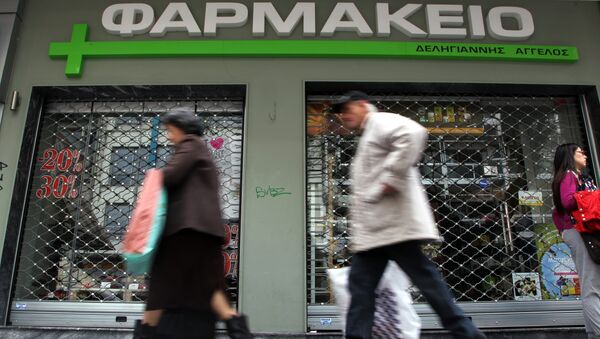In July 2015, Greece signed a deal for a third bailout package worth 86 billion euros (US$93 billion) in exchange for austerity reforms that include pension cuts and tax hikes.
The list of lenders includes the European Central Bank (ECB), the International Monetary Fund (IMF) and several eurozone nations.
#Greece | Approx 900,000 jobs lost btw 2009-14. Syriza govt steadily reversing situation, tackling #unemployment. pic.twitter.com/jb3UqnZ5Vp
— Dim Rapidis (@rapidis) July 3, 2017
One of the reforms that was demanded by the European Commission was for the Greek government to force pharmacies to ensure six out of ten medicines are generics by March 2018.
Generics cost a fraction of the price of brand-name drugs but Greece is at the bottom of the table when it comes to countries which dispense cheaper drugs.
Dandoulaki Stauroula pharmacy by Lefteris Tsikandilakis, Rethymno Crete — Greece https://t.co/nwrlsD2q83 pic.twitter.com/SDUvSyVT6T
— Retail Design Blog (@RetailDesignBG) June 8, 2017
Greek pharmacies and specialist doctors make big profits at present and receive lucrative incentives from the drug companies to prescribe their products, rather than cheaper alternatives.
But the resistance is not just among the pharmacists. Many Greeks themselves have an inbred fear of generic drugs.
"Greeks consider generics a second-class medicine due to a law in 2012 that said the poor people get generics," said Pascal Apostolides, president of the Hellenic Association of Pharmaceutical Companies.
Greece is a country with one of the highest numbers of doctors per capita in the world and a large number of pharmacies.
But when the economy crashed in 2008 hundreds of thousands were thrown out of work and lost their health insurance.
Prime Minister Alexis Tsipras, and his government, have been promising a law which would give healthcare access to those with no private insurance but that will further push up the drugs bill.
His government, dominated by the left-wing Syriza Party, is hoping to wriggle free of EU budgetary oversight next year but it depends on Athens meeting the targets set in the third bailout.
The troika of the European Commission, European Central Bank and International Monetary Fund, wants Greece to introduce an electronic system to automatically monitor doctors' prescriptions.
In May, Greece and the troika reached a deal on a package of bailout-mandated reforms, paving the way for the disbursement of another relief tranche. The Greek government needs US$8 billion to meet a debt repayment deadline later this month.



